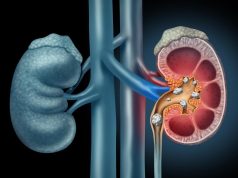Patients might need closer monitoring for further signs of pending cardiovascular issues
FRIDAY, Jan. 30, 2015 (HealthDay News) — Some people who develop recurring kidney stones may also have high levels of calcium deposits in their blood vessels, and that could explain their increased risk for cardiovascular disease, new research suggests. The findings were published online Jan. 29 in the Clinical Journal of the American Society of Nephrology.
Linda Shavit, M.D., a senior nephrologist at the Shaare Zedek Medical Center in Jerusalem, and colleagues utilized computed tomography scans to look for calcium deposits in the abdominal aorta. Of the 111 people in the study, 57 suffered recurring kidney stones that were comprised of calcium, and 54 did not have kidney stones. The authors found that those with recurring kidney stones made of calcium had higher calcium deposits in their abdominal aortas, but they also had less dense bones than those who did not have kidney stones.
“It’s becoming clear that having kidney stones is a bit like having raised blood pressure, raised blood lipids, or diabetes in that it is another indicator of, or risk factor for, cardiovascular disease and its consequences,” study coauthor Robert Unwin, M.D., of University College London, told HealthDay. Unwin is currently chief scientist with the AstraZeneca cardiovascular & metabolic diseases innovative medicines and early development science unit in Molndal, Sweden. The main message, Unwin said, “is to begin to take having kidney stones seriously in relation to cardiovascular disease risk, and to practice preventive monitoring and treatments, including diet and lifestyle.”
An accompanying editorial, written by Eric Taylor, M.D., of the Maine Medical Center in Portland and Brigham and Women’s Hospital in Boston, noted that it’s too early to incorporate a history of kidney stones into screening guidelines for cardiovascular risk factors or osteoporosis.
Copyright © 2015 HealthDay. All rights reserved.








